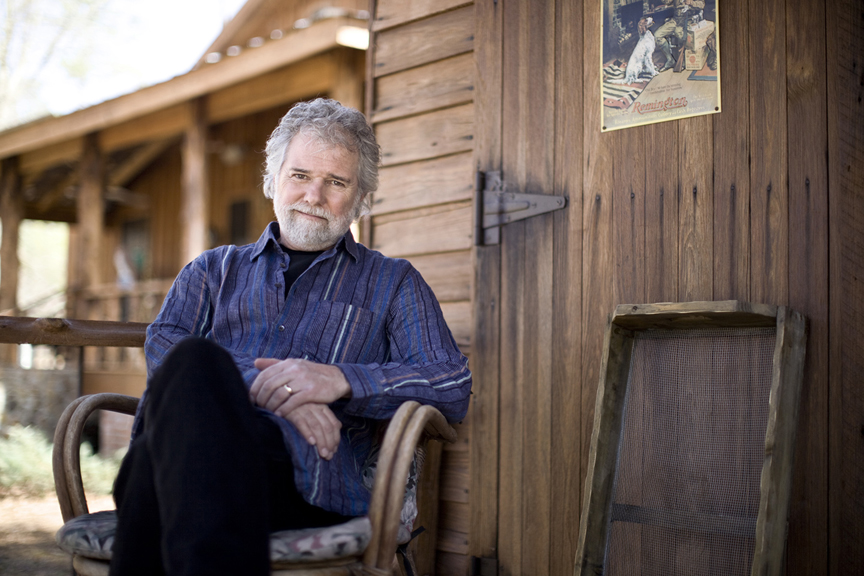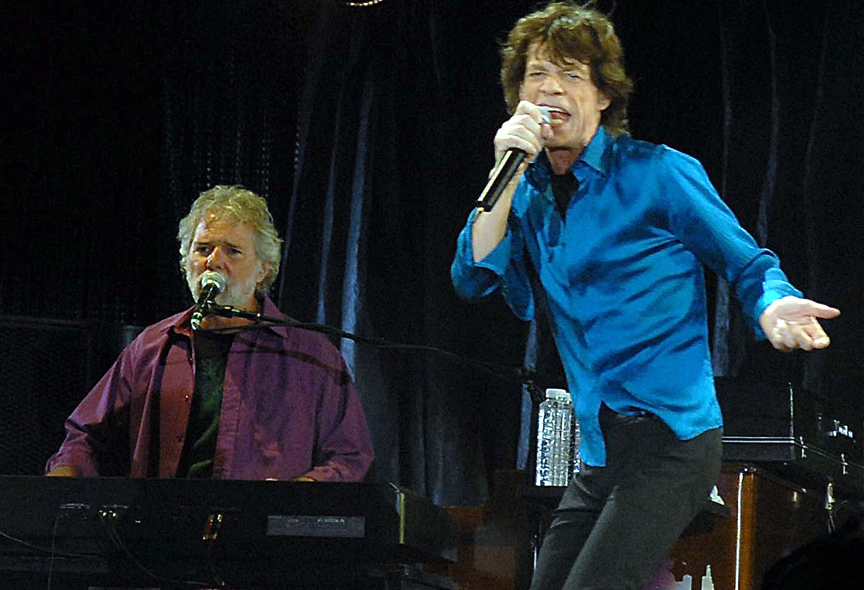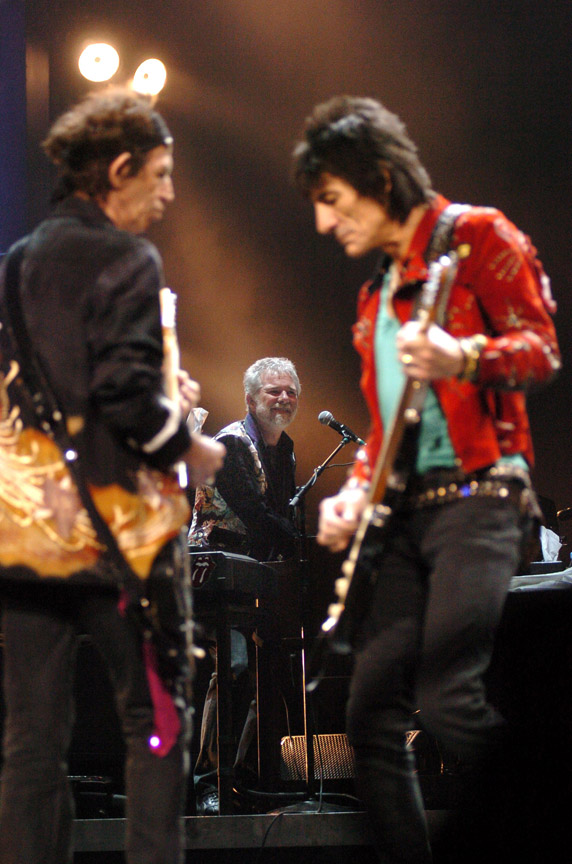
Gardening Green with Doug
Chuck Leavell Documentary ‘The Tree Man’
Explores Pianist’s Legendary Music, Environmentalism
By Doug Oster
September 29, 2021

Chuck Leavell is keyboardist and musical director for The Rolling Stones. He’s had a long, illustrious musical career as a member of the Allman Brothers. He’s also played with Eric Clapton, George Harrison, The Black Crowes, Train, Eric Church, John Mayer and many other artists.
Leavell has a love for music but also a deep passion for environmentalism. He’s spent over four decades as a sustainable forester, managing thousands of acres at his beloved Charlane Plantation.
Before the Stones hit Heinz Field on Monday, he sat down for a wide-ranging interview talking about music, the environment and Rose Lane, the love of his life. It’s all chronicled in the documentary film “Chuck Leavell: The Tree Man.”
Doug: Could you explain how you found your way to forestry and why it was forestry that saved your wife Rose Lane’s family property in Georgia?
Chuck: Well, back in 1981, Rose Lane's grandmother passed away, leaving her a nice, sizeable piece of land about 1,000 acres. It was a diversified farm. It had row crops, it had some cattle on it, and it did also have some forestry components. We had to think about what we were going to do with this land. We knew it was family land, and we certainly didn't want to sell it.
This was back in the early ‘80s and the estate tax situation was much different than it is today. The exemption was something like $300,000 and so we were saddled with a huge bill from the IRS for estate taxes.
It actually caused Rose Lane and her brother Alton to sell some property that they had inherited from their father. To make the initial payment to the IRS and then we had a 15-year schedule of payments to finish the rest of the money that was owed for the estate taxes.
So, I like to say that we didn't inherit anything. The U.S. government and the IRS inherited our land and they gave us the opportunity to buy it back from them.
Which is pretty much the way it was. It's much different now, we don't have such a challenge with the exemption being what it is, I think it's something like $10 million now, before you have to pay anything in estate taxes.
So, as we pondered what to do, of course, I wanted to follow my career in music. And it looked like row cropping and cattle farming, and some of the other things we looked at like peach trees or pecan trees or nursery stock, would be a whole lot of day-to-day requirements, and then we thought about forestry.
You know, first of all, there was a personal connection for me. Where does that instrument that's given me such joy and such a great career come from? And of course, it comes from the resource of wood, as do most musical instruments, so there was kind of a personal feeling of you know. If I could plant trees and take care of them, you know they do so many good things. Now I'm not going to use pine trees to make a piano or a guitar, but nevertheless, many good things are made from pine trees, such as materials to make books and magazines and newspapers and materials to build our home, schools and churches. And of course, they clean our air, they clean our water, provide home and shelter to all manner of wildlife.
So, it just seemed like the right thing to do, and also because it was long term it wouldn't require so much day-to-day that made sense for us. So, we moved forward with that. We started managing the forest that did exist on the acreage and then we began to plant trees and open fields and I began to study forestry and learn as much as I could about it, and I still consider myself a student of forestry.
So, between what I made as a musician and what we received from the proceeds of the sale of the land that Alton, my brother-in-law and Rose Lane sold, and then also using some timber harvest funds. We finally paid off the IRS and we're able to move forward.
Doug: Before you started working on Charlane, converting the property, did you feel a connection to the woods or did it come later?
Chuck: Well as I mentioned, there was a personal connection concerning music and wood, but as I learn more and more about forestry, there were so many other connections. I like to quote Ralph Waldo Emerson, who said “In the woods, we return to reason and faith.” And that means a lot to me, you know, in the crazy world of rock and roll, you need something to balance it. And for me the work I do in forestry is that balance and also just taking a walk in the woods and enjoying it aesthetically provides an incredible balance for me. So those are the personal connections that I have.
Doug: What was the genesis of “Chuck Leavell: The Tree Man” documentary?
Chuck: Well, my motivation was simply to have a document for future generations of our family. We have four grandchildren now, and you know I can see in the future maybe some great-grandchildren, and I wanted them to have some type of document, not just of me as a musician, but as our family and the love story that Rose Lane and I have together. And the work in the environmental arena. So that was my motivation.
I was so proud of the way it turned out. Our filmmaker, Alan Forrest just did a wonderful job of weaving those three themes together: the music, the conservation, and the love story. And so now I'm very proud to have that, but of course, it doesn't hurt that it also tells my story to the public. And hopefully, it let's people that have heard songs that I've played on or seen me live and in concert know a little bit more about my career and what I've been doing for the last 50 years.
Doug: In the film, you described learning to play from your mother and discovering from her that music was more about emotions, colors and feelings than notes and chords. That's a fascinating point. Could you talk a little bit about that and how it affects the way you've played over the years?
Chuck: Well, yes. It's so true. You know when I sit down to do a recording session with someone — whether it's in person or remotely — the first thing I do, of course, is listen to the song I like, try to listen deeply to it, listen to lyrics if it's a song that has lyrics and try to find the meaning of that song.
Listen to the melody, the rhythms. And I try to think about how I can color the music with what talents that I do have. And contribute emotionally to the track. You know, if it's a rock and roll track and up, great. You know, let's find some joy in there. If it's something that is poignant and requires a different emotion, well I try to go there and it takes some experimentation. It just doesn't happen automatically. It's a process. It's not like you just push a button and the emotions are there. And that's what I talk about. Listening. Listening is so important. You know, listening to what the song is saying, what the song is asking me to play.
Doug: One of the most wonderful surprises of the film is that it's such a powerful love story between you and Rose Lane. I've been lucky enough to see the two of you together, albeit briefly. Tell me a little bit about your relationship.
Chuck: Well, you know, I think the role models that both of our parents had, says a lot about our own relationship. My parents stayed together until my dad passed away — at a fairly early age by the way. He was 56, and I was only 17 at the time, so you know it was a great loss for me. I was just becoming friends with my dad on a more adult level.
My mom did live much longer. I think she was 76 when she passed away. But you know the fact that they stayed together. The examples that they set as parents, the love that they had between them, watching them be affectionate with each other, and I think the same is true with Rose Lane and her parents.
You know the saying is that family is everything, and if you stick out the hard times, and we all have hard times in marriages, it’s not always a piece of cake or an easy ride. But you know the saying that what doesn't kill you makes you stronger, I think is also true. You know somebody that I also see as a role model is my friend, President Carter and his wife, Rosalynn Carter. They just recently celebrated their 75th anniversary. I think when I see some wonderful people like the Carters and others that have long marriages that have great relationships, you know that makes me want to emulate them and makes me want to continue the relationship that I have with Rose Lane and we're blessed. We have a 50th anniversary in another couple of years and I'm excited about that.
Doug: I couldn't help but notice the beautiful raised bed vegetable garden at Charlane. Is that a Rose Lane thing or something you enjoy too?
Chuck: Well, Rose Lane is definitely more the gardener than I am, but I do love going out there and helping every now and then. And we also have staff at Charlane that help with the garden. But as you know, Doug and as your listeners, there's just such joy that you get out of putting that seed in the ground. You know, looking after it, watering it, nurturing it as it grows, and then seeing those vegetables come to be and then taking them and putting them in the kitchen and rinsing them off and enjoying fresh tomatoes or cucumbers or carrots or celery or whatever it may be. But it's really mostly Rose Lane that looks after our garden.
Doug: Also, in the film, you talk about Paris as not only the city of lights, but the city of trees, and they let you drive a boat through Paris?
Chuck: Yes, that was an incredible segment. It really was our filmmaker Allen who arranged for that boat trip and it really was so, so special. I can't tell you, it was a beautiful evening, late afternoon into evening. It was a really cool little boat, and it was a very romantic setting. You're in Paris, for heaven's sake, doesn't get much more romantic than that — up and down the Seine River. And yeah, not many people knew that about Paris, that every tree in Paris is documented, so they have an incredible urban forest in Paris. And I think it stands as a model that many other cities could follow.

Doug: Back to the trees. When did you realize that sustainable forestry was so important and that spreading the word about the type of work was equally as critical?
Chuck: Well, once we made the decision to primarily focus on forestry at Charlane, then it began a process of studying and educating myself and ourselves. Rose Lane, of course, was involved as well and you know, I went to government sources, the NRCS. So, which I think back then was called the Conservation Service or something, but they had great pamphlets and information and I went to the library and checked out books on forestry and land use.
I went to meetings and seminars that were put on by forest organizations. I just tried to talk to other people that were doing this. I talked to foresters and just educated myself as best I could on the process of managing forestland.
I still consider myself a student of forestry. You know I've always wished I could take enough time off to go take some dendrology courses and learn more about tree identification and such. I guess it was somewhere in the mid-‘80s that I realized it was beyond just the work itself, but the advocacy that was important.
To let other people know how important trees and forests are in so many different ways and so that brought the first book called Forever Green: The History and Hope of the American Forest. After that I realized the importance of educating young people about these issues, and that's when the children's book The Tree Farmer came to be. Later on, I started thinking about the challenges we have with the population of our own country and population of the world and the pressure on our natural resources and that's when I came up with Growing a Better America: Smart, Strong and Sustainable. So, I enjoy the advocacy. I enjoy giving speeches from time to time to various groups. I enjoy going to schools and interacting with young people on these subjects. And, you know, I think music gives me a little bit of an interesting platform too. To make these outreach efforts.
Doug: In general, how are you feeling about the environmental direction of our country?
Chuck: Doug, this is such a critical point, in our country and throughout the world. I mean, you know, you have to be a madman not to understand where we are. Environmentally, the pressures that we've put on our lands and our air and water.
Climate change is as real as it gets. I think more and more people are understanding that now and what' s critical is the policies that we put into place. I hope so much that President Biden and the Democrats can pass some policies that will start to really seriously begin to face these challenges that we have so you know I'm hopeful about it.
But you know, there are still some naysayers out there. It's not easy to pass these huge budgets that it's going to require to put these policies and efforts into place. And along with that, we're talking infrastructure, which also is a big challenge and needs to be addressed.
It seems more and more like some of the other countries that are at fault for contributing, like China, and maybe not so much Russia, but I think Russia is waking up and wanting to do better and I think China is waking up and wanting to do better, but these are an immense challenge.
And if we don't start, you got to take those first steps and then hopefully as we go along, we take more and more steps and make the changes that we really need to be seeing.
Doug: How can people concerned about the environment make a difference? Or can they?
Chuck: Well of course, I mean even I always tell people first thing go plant a tree. It'll make you feel good. It's easy to do. You get to watch it grow. Plant a lot of trees, plant trees in your yard, plant trees in your neighborhood, plant trees in parks at your children's schools.
But you know, beyond that, of course, you can get involved with organizations that are doing their best. You have to be careful you want to make sure that if you're contributing money, that the money is actually going for the effort and not just to administrative costs and that requires a little digging, OK? You got to dig into these organizations and see, but you know support candidates that believe in these efforts to do better by the environment, support policies.
Call your congresspeople senators and legislators and let them know how you feel about things. Write them letters. It's easy to do online these days. You know everything is online and easy, so you can express yourself. Talk to your friends about it and get them involved if you can. But again, planting a tree is a very good feeling.
Doug: What do you hope people? Will get out of watching The Tree Man and how can people see the documentary?
Chuck: Well, again, I think you know the impetus for me was just to have a document for my family and I guess also for a clip of a period of time. You know, I guess we're looking mostly at the 70s through the present day in this documentary, but I think it is a very interesting period of time and hopefully, it serves that purpose as well. And as far as how people can see it, at present, it is available on almost all streaming services and that includes Apple TV, Amazon Prime, Hulu, Tubi, all of those services, with the exception of Netflix. We are not on Netflix yet. We may be in the future, but right now it's all the other ones.
It's very easy to find if you just Google Chuck Leavell, The Tree Man. It pops up all over the place. It's also available in hard copy form on Amazon or on my website Chuckleavell.com. It's available in Blu-Ray and on DVD, so there are all kinds of options for people to view it and I hope they will.

Leave A Comment